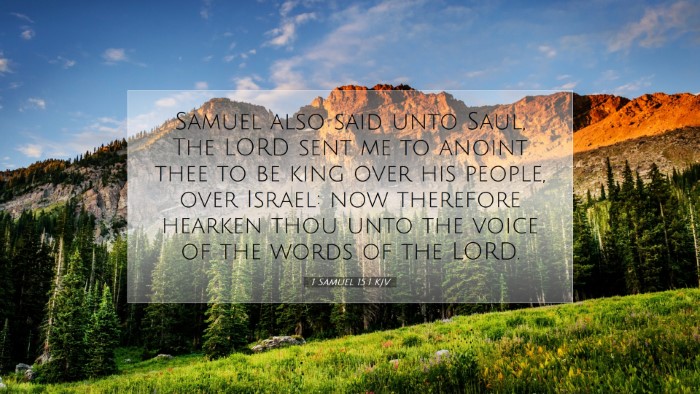Commentary on 1 Samuel 15:1
1 Samuel 15:1 presents a pivotal moment in the narrative of Israel's monarchy, reflecting the profound implications of obedience and disobedience to God's commands. This verse sets the stage for the critical events that follow, whereby God's instructions are conveyed to Saul through the prophet Samuel. Below is a synthesis of insights from public domain commentaries by notable theologians that elucidate the deeper meanings within this text.
Contextual Overview
Samuel, the prophet and last judge of Israel, stands as a key figure in this verse. His role signifies the transition of Israel from a theocracy led by prophets to a monarchy led by kings. Saul’s selection as king was marked by divine ordination, yet his impending disobedience underscores a critical theme of the text: human failings in fulfilling God's commands.
Divine Commission
Matthew Henry emphasizes that Samuel's delivery of God’s message is a reflection of the prophetic office’s authority and the seriousness of the divine mandate. He notes that the phrase “The Lord sent me” underlines that the message originates not from human ambition but from divine decree, reinforcing the necessity for leaders to heed God’s voice.
Call for Judgment
Albert Barnes highlights that the command delivered to Saul carries a tone of judgment against the Amalekites, a group marked for destruction due to their atrocities against Israel. The historical context demonstrates God’s unwavering justice, where the long-standing offenses of the Amalekites culminate in this divine command. This teaches us about God's holiness and the seriousness of sin, suggesting that rebellion against God has severe consequences.
The Role of Obedience
Adam Clarke reflects on the theological implications of obedience, stating that God desires not ritual sacrifice but heartfelt obedience. Clarke elaborates that this verse foreshadows Saul’s forthcoming failure to carry out God’s command, illustrating the tension between divine expectation and human action. The importance of obedience is a recurrent theme throughout Scripture, demonstrating that true worship stems from complying with God's will.
Theological Themes
-
The Sovereignty of God:
1 Samuel 15:1 emphasizes God's ultimate authority over nations and individuals, showcasing His role as judge and avenger. His commands reflect His characters, such as justice and mercy, highlighting the complex nature of His dealings with humanity.
-
Sin and Judgment:
The fate of the Amalekites serves as a stark reminder of the consequences of sin. The call for their destruction signifies God's intolerance for disobedience and prompts introspection on individual and corporate adherence to His statutes.
-
Human Agency:
Saul's response to this divine command showcases human agency and the often-fraught relationship between divine order and human decisions. This chapter prompts theological questions regarding free will and predestination.
-
Leadership and Accountability:
Saul's position as king brings about a heightened responsibility for obeying God's word. Samuel’s message serves as a call to all leaders to act in accordance with divine will, emphasizing the weight of their decisions on those they govern.
Practical Applications
In light of the themes and messages distilled from 1 Samuel 15:1, several practical applications emerge for contemporary pastors, theologians, and scholars.
-
Importance of Divine Guidance:
Like Samuel, faith leaders today are called to be conduits of God's word. It is essential to seek and communicate God’s will faithfully, ensuring that congregations are also attuned to discernment and obedience.
-
The Weight of Responsibility:
Understanding the power and repercussions of leadership can guide those in authoritative positions to exercise their roles with humility and reverence to God's commands.
-
Call to Obedience:
This passage invites reflection on personal obedience to God's commands, urging believers to examine areas of their lives where they may falter in faithfulness.
-
Engaging with God’s Justice:
The narrative serves as an opportunity to discuss matters of justice within the church and society, encouraging proactive engagement with issues of morality and the consequences of sin.
Conclusion
In summary, 1 Samuel 15:1 serves as a critical reminder of the interplay between divine command and human response. The insights provided by commentators such as Matthew Henry, Albert Barnes, and Adam Clarke encourage modern readers—pastors, students, theologians, and scholars—to approach this text with a heart and mind ready to learn from its profound truth. The themes of obedience, divine justice, and the weight of leadership echo throughout the ages, reminding us that God’s word remains timeless and applicable to every generation.


